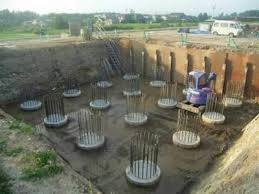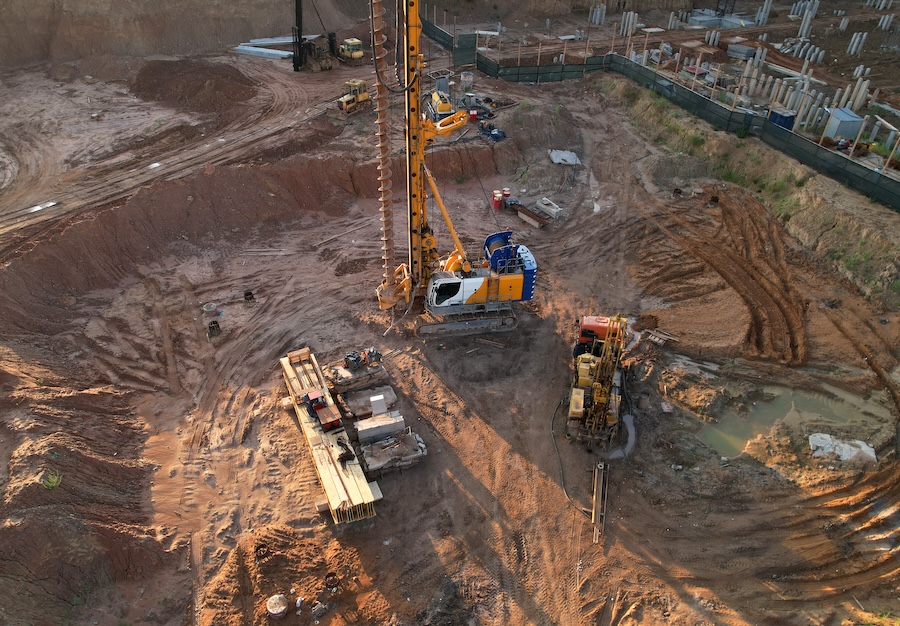Geotechnical Engineer Description: What to Expect from These Professionals
Geotechnical Engineer Description: What to Expect from These Professionals
Blog Article
The Importance of Geotechnical Engineering in Addressing Environmental Challenges and Enhancing Construction Security
Geotechnical engineering offers as a cornerstone in the junction of environmental stewardship and building and construction safety, giving important insights right into the behavior of soil and rock under numerous conditions. By applying tactical website investigations and tailored reduction steps, geotechnical designers play a vital function in guarding both human lives and ecological stability.

Function of Geotechnical Engineering
Geotechnical engineering plays an essential function in the design and construction of infrastructure by addressing the actions of dirt and rock materials under different conditions. This area of design is crucial for recognizing the interaction between frameworks and the ground, which consists of figuring out the load-bearing capability of soil, analyzing security, and predicting potential negotiation or failure.
Geotechnical engineers are in charge of carrying out site examinations, which include sampling and screening soil and rock to gather information on their chemical and physical homes. This information is essential for creating foundations, preserving walls, and various other earth-retaining structures that ensure safety and long life. Additionally, geotechnical engineering notifies the choice of appropriate construction approaches and products, therefore decreasing dangers related to dirt behavior.
Additionally, the integration of geotechnical engineering concepts into metropolitan preparation and environmental administration is crucial for attending to obstacles such as ground contamination and groundwater management. By comprehending geotechnical variables, engineers can establish lasting solutions that enhance the durability of framework against natural dangers, while additionally promoting environmental stewardship. Eventually, the function of geotechnical design is indispensable for accomplishing secure, durable, and ecologically aware building and construction methods.
Soil Disintegration Reduction
Dirt erosion poses a considerable hazard to both ecological security and infrastructure stability, affecting around 24 billion bunches of fertile soil lost yearly worldwide. This sensation is aggravated by variables such as logging, urbanization, and inadequate agricultural practices. Geotechnical engineering plays a pivotal role in developing effective soil erosion reduction approaches that safeguard both the environment and building and construction projects.
One approach requires the execution of disintegration control methods such as greenery planting, which stabilizes soil through root systems. In addition, the construction of retaining terraces and walls can successfully lower surface area runoff and shield vulnerable locations from disintegration. Correct drain style is additionally critical; it lessens water build-up and directs excess drainage far from crucial structures.
In addition, geotechnical designers employ dirt stabilization techniques, such as the application of geotextiles and eco-friendly mats, to enhance dirt cohesion and protect against deterioration - geotechnical engineer description. Routine monitoring and analysis of erosion-prone sites make it possible for timely treatments, making sure long-term sustainability. By incorporating these methods, geotechnical design not only minimizes the effects of dirt erosion yet also adds to the durability of framework against ecological challenges, inevitably fostering a much safer and more sustainable constructed atmosphere
Groundwater Defense Techniques
Groundwater functions as an important source for alcohol consumption water, agriculture, and commercial processes, making its defense important for ecological sustainability and public health. Efficient groundwater defense techniques are important in mitigating contamination dangers and making certain the longevity of this resource.

Regular surveillance of groundwater high quality is also essential, making it possible for early discovery of contamination sources and promoting timely removal efforts. Utilizing innovative innovations, such as geophysical studies and remote noticing, help in identifying possible risks to groundwater gets.
Additionally, public education and learning and stakeholder engagement are vital, fostering area support for groundwater security campaigns. geotechnical engineer description. By integrating governing measures, technical innovations, and community involvement, we can develop a comprehensive framework that safeguards groundwater sources while advertising lasting development and building techniques
Landslide Risk Management
Landslides present substantial threats to both human safety and facilities, making reliable threat management techniques necessary. Geotechnical design plays an essential function in determining, analyzing, and mitigating landslide risks. A comprehensive understanding of slope stability, soil auto mechanics, and hydrology is crucial for establishing reliable risk management plans.
The very first step in landslide danger administration entails comprehensive site investigations, which include geological mapping and soil testing. These investigations help engineers evaluate the potential for landslides by identifying vital elements such as slope angles, soil composition, and water content. Making use of innovative modern technologies such as remote picking up and geophysical studies can improve the accuracy of these assessments.
Once threats are recognized, ideal reduction steps can be executed. These may include design options such as keeping walls, drainage systems, and incline stablizing methods. Keeping an eye on systems learn the facts here now ought to be developed to find indications of ground activity and modifications in water levels, permitting for proactive treatments.

Enhancing Construction Safety
Construction sites often present a myriad of hazards that can threaten employee safety and security and task stability. Geotechnical engineering plays a vital function in enhancing construction safety by giving crucial understandings right into subsurface conditions. Through comprehensive dirt and rock evaluation, geotechnical engineers can identify possible dangers, such as soil instability, groundwater issues, and seismic susceptabilities, which might compromise the safety of building and construction activities.
Implementing geotechnical remedies, such as proper structure style and the usage of keeping frameworks, reduces these threats considerably. These solutions not only make certain the stability of visit this web-site the frameworks being constructed yet likewise develop a much safer working setting for construction workers.
Furthermore, promoting a culture of security through training and adherence to established security protocols better boosts building and construction site security. By integrating geotechnical knowledge into the planning and execution phases, construction projects can achieve greater security requirements, eventually safeguarding workers and guaranteeing successful project completion.
Verdict
To conclude, geotechnical design functions as an essential technique in taking on ecological difficulties and promoting construction safety and security. Via efficient soil erosion reduction, groundwater security techniques, and landslide risk monitoring, geotechnical designers contribute to the development of resistant framework. The combination of these practices cultivates a more secure building environment and boosts the sustainability of civil engineering projects. Inevitably, the competence of geotechnical engineers is crucial in securing both natural deposits and human lives versus see post potential threats.
Geotechnical design serves as a foundation in the junction of environmental stewardship and building and construction safety, supplying crucial understandings right into the behavior of dirt and rock under numerous conditions. Geotechnical engineering educates the selection of suitable building and construction methods and materials, therefore reducing threats associated with soil habits.
Geotechnical design plays a crucial role in establishing efficient dirt erosion mitigation methods that guard both the environment and building jobs.
In addition, geotechnical designers employ soil stablizing strategies, such as the application of geotextiles and biodegradable mats, to improve soil cohesion and stop destruction. With thorough dirt and rock analysis, geotechnical engineers can determine potential risks, such as soil instability, groundwater problems, and seismic vulnerabilities, which may jeopardize the security of building activities.
Report this page